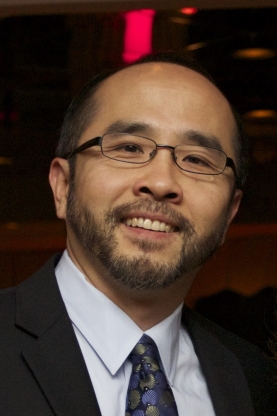Francis Su
 When the Mathematical Association of America (MAA) holds its annual meeting in January, it usually features lectures from professors and mathematicians about their groundbreaking research and latest achievements. But Harvey Mudd professor and Haimo Award winner Francis Su had a very different message for the MAA: Our accomplishments do not have to define our identities.
When the Mathematical Association of America (MAA) holds its annual meeting in January, it usually features lectures from professors and mathematicians about their groundbreaking research and latest achievements. But Harvey Mudd professor and Haimo Award winner Francis Su had a very different message for the MAA: Our accomplishments do not have to define our identities.
Giving Grace
Su, who became a Christian as an undergraduate at the University of Texas, spoke about the need for people to treat one another with grace. He recalled his years as a graduate student, when he was struggling with his academic work and discouraged by his advisor from continuing to work in mathematics. Rather than leave his program, Su found a new advisor who treated Su with dignity no matter how his research was going. “Having my worthiness separated from my performance gave me great freedom,” Su recalled.
Su helped the MAA audience envision the freedom and healing that comes with grace: “I can have a healthy ambition without competition … I can be happy for another person’s success. I can be appropriately open and authentic —I don’t have to fear showing weakness. Because my worthiness isn’t earned, there’s no need and no room for pretense. I can stop worrying about what others will think of me, if I believe the lesson of grace.” Su also gave examples of how treating his students with grace has changed his teaching style, in the hopes that his peers would “recognize the good news inherent in a message of grace.” His entire talk emphasized a view of the human person formed by his Christian faith—that we are all given dignity and worth by God beyond anything we could earn.
Relating Faith and Mathematics
Delivering a speech about grace at the event meant to recognize his teaching achievements might seem unusual, but it is not out of character for Su. He was involved in InterVarsity’s Graduate and Faculty ministry at Harvard, which he credits with helping him think through the relationship between his faith and his mathematics career.
Su is also a member of InterVarsity’s Emerging Scholars Network (ESN), a group of over 4,000 members that seeks to encourage and equip Christian scholars, as they practice their disciplines, to have a redemptive influence on academic culture. Su has been committed to the Network since 2004. “He is a model … for younger Emerging Scholars,” says Thomas Grosh, Associate Director of ESN. “I am particularly impressed by his focused listening and encouragement.” Su was recently elected President of the MAA, a position where his considerable teaching skills will be able to have a wide-ranging impact on mathematics education.
Overwhelming Response
The response to Su’s talk has been overwhelming. “It elicited an enormous outpouring of emotion at the conference,” Su says. “Many approached me afterwards to thank me, and recount their own stories.” So many people asked Su for a copy of his remarks that he created a blog to post the speech. Within two days, it received 10,000 page views.
The comments on the blog expressed the same appreciation for Su’s words as his colleagues had at the conference. One reader posted, “I’m a Jewish atheist, so ‘grace’ in this sense is not a concept I’ve much explored. But everything you say resonates with me at the deepest level.” It is clear that the speech left a powerful impression on its audience and many others, which Su says was his goal: “We’re all students and we’re all teachers, and we can all benefit from understanding the lesson of grace in teaching.”
InterVarsity’s Graduate and Faculty ministry, as well as the ESN, is helping thousands of scholars explore the relationship between their academic vocations and their faith, and how the two might be integrated—in the hopes that they, like Su, can bring the message of grace to an academic world that often passes it by.